International Media
MNP Q&A: Jamela Alindogan, News Correspondent for Al Jazeera English
For our 8th-anniversary special, we are profiling one of the finest journalists of this generation.

Fear is not something you would associate with Jamela Alindogan, the award-winning correspondent of Al Jazeera English. Just look at her body of work, and you’ll get an idea of how courageous she is as a journalist.
Alindogan, now 35, has covered various conflict stories in Southeast Asia since joining the Qatari-funded news agency more than a decade ago.
From covering the tension-filled elections in Indonesia and Malaysia to the violent protests in Vietnam and Cambodia, Alindogan’s assignments have also taken her to some of the most dangerous places in the southern part of the Philippines, like Zamboanga, where she was the first international journalist to cover the bloody siege between the government and Muslim rebels in 2013, and Marawi, where she, for much of 2017, covered the crisis there.
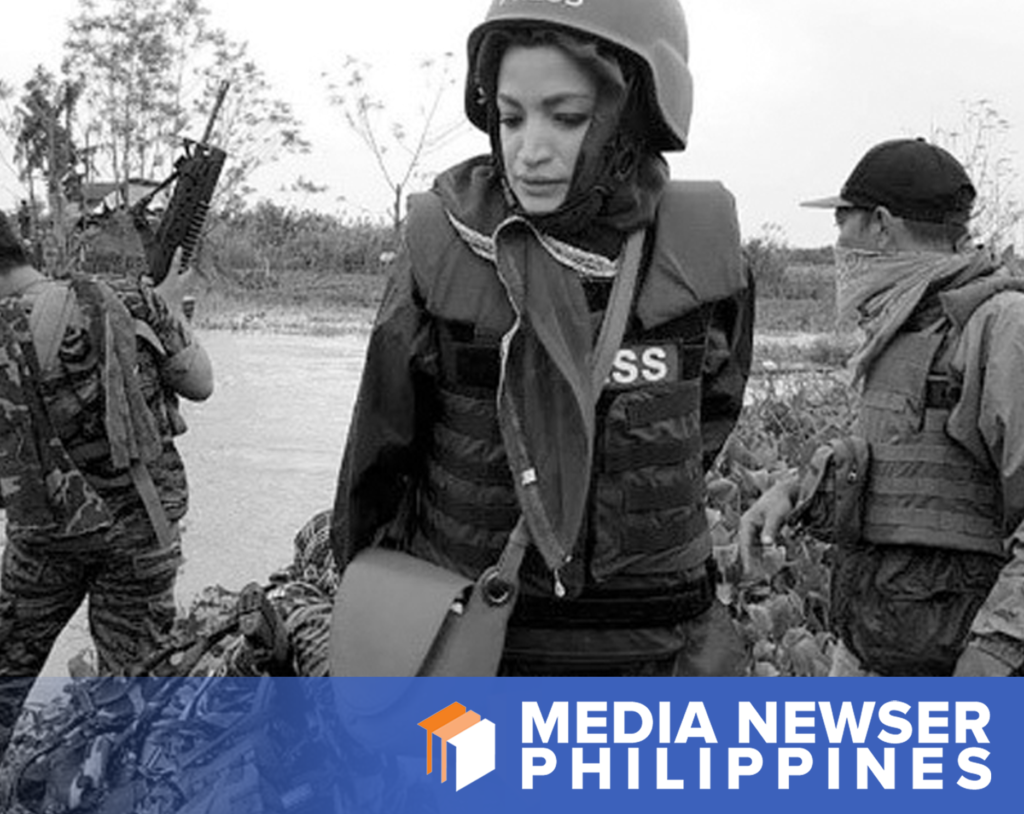
Alindogan, who was among our media winners for 2017, described her reporting in Marawi as “one of the most challenging and difficult coverage” she has ever had.
Photo: Jamela Alindogan
Inspired by her struggles in life, Alindogan originally wanted to take up law before shifting to journalism — one that she initially considered as a pre-law course.
“I wanted to take up law. I would like to believe that it was an idea I got from my grandmother, who told me there aren’t enough lawyers out there willing to take on the cases of poor people. Back in the province, my family’s land was taken away from them, so I grew up with that idea. It changed when I joined the school paper at FEU. That’s where it all started,” she says.
At Far Eastern University, she was a “really serious student,” juggling her studies with work as a reporter for its school paper, The Advocate. Simultaneously, between 2001 and 2003, she was also a sports correspondent for ABS-CBN Sports and RPN9.
Fresh out of college in 2006, Alindogan joined Al Jazeera’s Manila bureau as an intern, where she would work for a year without pay.
“I guess some might find it insane, but not realizing it back then, I was just too stubborn to give up. I really just wanted to learn, and I looked up to the Al Jazeera team then to soak up everything,” she says.
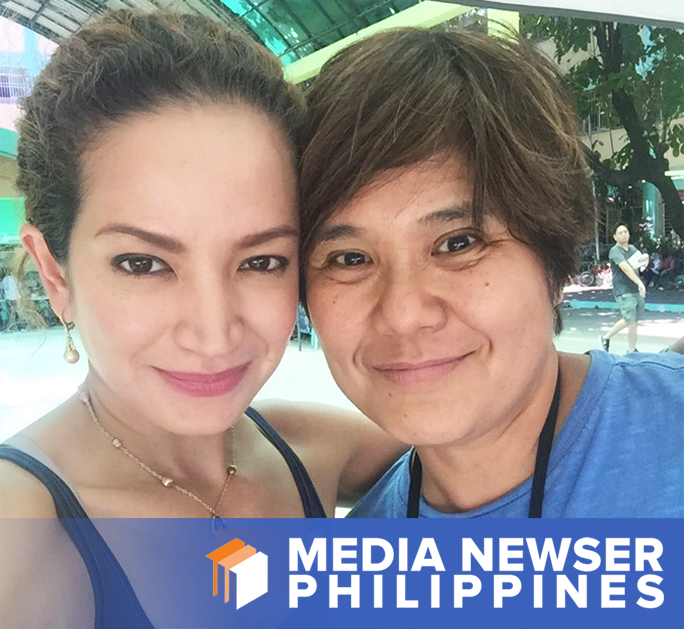
Alindogan on her mentor Charie Villa: “She was very emphatic about my struggle back then as a reporter, she was supportive of my story ideas and I’d say her integrity remains intact.”
Photo: Jamela Alindogan
After her internship ended, then-ABS-CBN News executive Charie Villa offered her the opportunity to become a police beat reporter for the Kapamilya Network, reporting mainly for its flagship newscasts, TV Patrol and Bandila. Alindogan took the chance, which she said “taught me how to become a street fighter.”
“The stories are often intense, and the turnover of reports is quick, so I learned how to be persistent, considering there is a tighter deadline. ABS-CBN taught me patience, and I learned how to work and be part of a bigger newsroom,” she says.
After her stint at ABS-CBN, she was hired once again by Al Jazeera — only this time as a producer. She would later be promoted to correspondent, a position she has held since 2008.
For our 8th-anniversary special, we are profiling one of the finest journalists of this generation. Here, Alindogan talks about her sturdy résumé in broadcast news, her experience interviewing President Rodrigo Duterte, and what it’s like being the leading conflict reporter in Southeast Asia.
Name: Jamela Alindogan-Caudron
Birthdate: February 7, 1983
Occupation: Correspondent, Al Jazeera English
Education: Bachelor or Arts in Mass Communications, Far Eastern University
Guiding Principle: Live a life of truth and substance
Media Idols: There are so many amazing journos out there but I look up to my Al Jazeera colleagues the most — Hoda Abdel-Hamid, James Bays, Subina Shrestha, to name a few
News Sources: I read almost every paper out there but for stories I work on, I rely mostly on on-the-ground sources
Facebook Account: jamela.alindogan
Twitter Handle: @jamelaaisha

On Thursday, June 21, Alindogan was elected president of the Foreign Correspondents Association of the
Philippines (FOCAP).
Photo: Jamela Alindogan
Who is Jamela Alindogan on- and off-camera?
I’d like to believe that there is not much difference because I always make sure that I apply my principles in every aspect of my life. My work is an extension of who I really am, although I do show more restraint when I am on-cam. Off-cam, I am much more candid, I guess like most journalists.
What drove you to pursue a career in broadcast journalism?
I wanted to take up law. I would like to believe that it was an idea I got from my grandmother who told me there aren’t enough lawyers out there who are willing to take on cases of poor people. Back in the province, my family’s land was taken away from them so I grew up with that idea. It changed when I joined the school paper in FEU. That’s where it all started.
You began your broadcasting career as a reporter for the UAAP and PBL while you were still in college. How were you able to balance work and school back then?
I don’t think I had balance, unfortunately. I was a really serious student growing up. It was just work and school. There was not much time for socials. I lightened up in my 30s.
After graduating from college, the opportunity to become an intern for Al Jazeera Manila came knocking. How was it like working for over a year with no pay? Not a lot of people would do that — only those who are passionate about journalism.
I worked for a year without pay, yes. I guess some might find it insane, but I guess not realizing it back then, I was just too stubborn to give up. I really just wanted to learn. And I looked up to the Al Jazeera team then to soak up everything.
After Al Jazeera, Charie Villa hired you as a reporter for ABS-CBN News. How would you sum up your experience working in and for one of the major networks in the country?
I am proud to have been part of ABS-CBN News. The extent of the work done by journalists there really is public service. The police beat taught me how to become a street fighter. The stories are often intense and the turnover of reports is quick so I learned how to be persistent, considering there is a tighter deadline. ABS-CBN taught me patience, and I learned how to work and be part of a bigger newsroom.
Covering police operations is sort of like a baptism of fire for Filipino journalists. Tell us about your most memorable reporting back when you were in the police beat.
My first crime story was about a taxi driver who was killed by robbers. I saw his body from afar, he had one stab wound on the chest, it was fatal. They used an icepick that’s why he didn’t really bleed. He was already in his late 60s. As I walked towards him, I saw that his upper body was hanging from the front seat of the car, his mouth open. His AM radio was still on. It was one of the saddest scenes I’ve ever witnessed. How much did the robbers take in the end? 200-300 pesos? And in the end, he had to pay it with his life.
You also served as a weekend news anchor for ANC back when it was the only news channel in the country. How much do you miss anchoring a news broadcast?
I did it while I was a producer of Al Jazeera. I like it but I’d like to say that I do enjoy working in the field more.
After ABS-CBN News, Al Jazeera would once again hire you — this time as a correspondent. How did your internship there and also your experience with the Kapamilya news division prepare you for this position?
By the time I went back to Al Jazeera I had gained more confidence as a reporter. Local media reporting also helps you gain more understanding of the nuances of the stories so you are able to give more context to the foreign audience.
While covering the Lahad Datu standoff in early 2013, Alindogan and her Al Jazeera colleagues, Mark Giddens and Steven Chao, were detained and questioned for several hours by the Malaysian police.
Video: Al Jazeera
You were detained and arrested while covering a story in Sabah, Malaysia. What did you learn from that particular experience?
I learned that as a journalist, there will always be surprises, no matter how experienced you are in assessing the risks. I thought of many other scenarios before getting deployed, but getting arrested for one thing was not one of those.
Reporting in armed conflict areas like Mindanao has its risks. As a parent, what are the things you consider before proceeding to these dangerous assignments?
There are many. For one, I always remember that I am not just responsible for my own safety, but also the team’s, and they too have their own families. I always make sure that we sit down and agree on our next course of actions on deployments, and that we voice out our concerns as much as possible. There may be a team leader in a sense, but everyone’s input is critical. Putting our heads together helps us identify the risks and prepare before deploying. I guess that’s pretty much it.
What’s the worst thing about covering humanitarian and armed conflict issues?
I can handle the gore and the violence. I can handle the dead bodies, but I find it harder to process the suffering of the living. Seeing women and children in evacuation centers, as they suffer from the crisis brought about by the fighting or conflict form their communities, put me back into focus, that the story is really about them — the story of the voiceless and the oppressed.
And that is where charity comes in. Tell us about your aid group Sinagtala. How important is it for you to give back?
I see Sinagtala as an extension of what I do as a journalist. I am always caught in a bind. I am guilty when I am working away from my family, and I also feel guilty when I leave a disaster area to go back to the comforts of my own home. I believe in the power of journalism, but sometimes I feel that isn’t enough, so this is my way of dealing with that guilt, I guess. I co-found an aid organization that assists women and children in conflict. We open safe spaces in disaster zones that serve as refuge. We have toy libraries in different parts of Mindanao and we also opened two weaving centers in Marawi that provide training and livelihood for women displaced by the war.
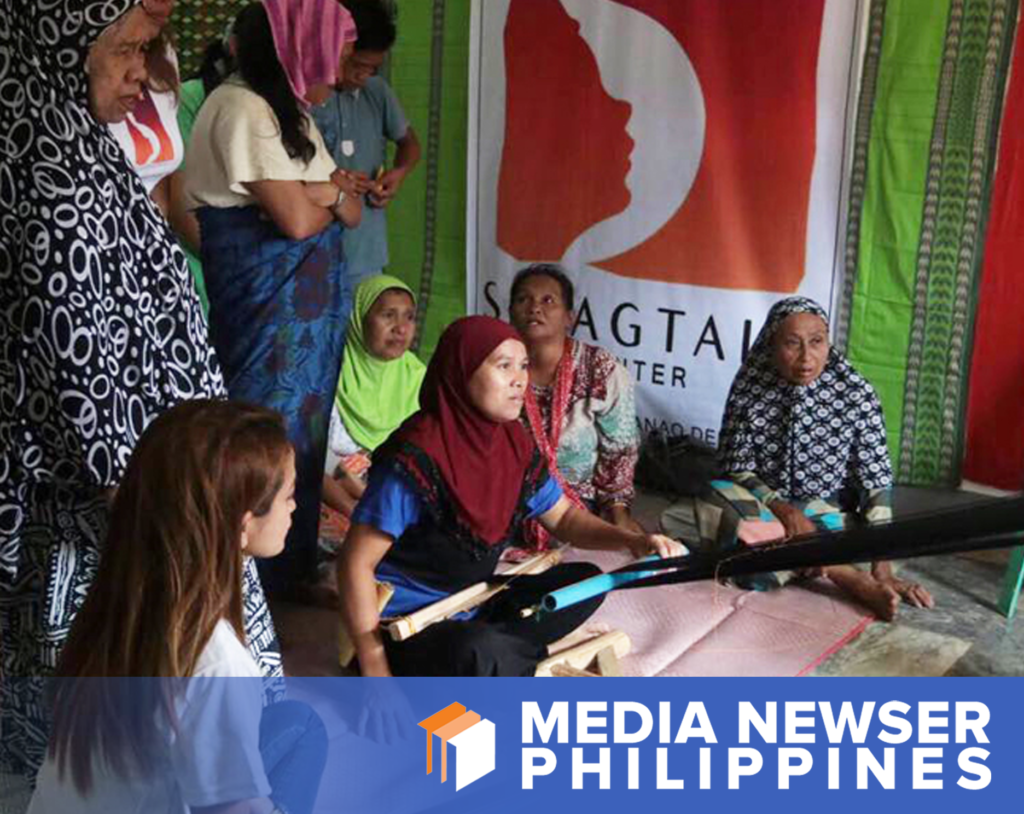
Calling it an “extension” of her work as a journalist, Alindogan co-founded Sinagtala, a non-profit organization which main purpose is to help women and children in conflict areas. It has since been recognized by the Provincial Government of Lanao Del Sur for its role in helping the victims of the Marawi crisis.
Let’s go back to Charie Villa. You said she is one of your mentors. Tell us about your mentor-mentee relationship. How important it is for a journalist to have a mentor?
I’d like to say that Charie is a journalist’s ideal editor. She has a long experience in the field as a producer and reporter so she understands what field correspondents are going through. She was very emphatic about my struggle back then as a reporter, she was supportive of my story ideas and I’d say her integrity remains intact. The best mentor or editor that a journalist can have, really, is someone like Charie who understands what it takes to produce the story from start to finish. And her mettle has been tested.
Tell us about your background. You said you came from a poor family. Was it your motivation to strive harder and do better, both in your personal and professional career?
I came from a poor family. I was raised by my grandparents and I put myself to school. Growing up, there were times when I wished for a different life. But now, I am proud that my experiences and hardships equipped me to deal with the challenges I had. I take those lessons to heart, and I am grateful for them.
You are one of the most distinguished alumni of Far Eastern University and recently you’ve been awarded with the Outstanding Alumni Award. How did that institution shape your character and values as a Filipino and as a journalist?
I had the most amazing professors in college who took the time to get to know me and many other students who were willing to listen for professional and career advice. I can’t remember how many times I sat down with several professors. There were also those who called me out when I was drowning with work and extracurricular activities. There was a time when I quit school because I didn’t really have money so I had to work full-time. My professors kept getting in touch with me, reminding me the importance of a University education. I am so grateful to have them in my life.
We have more information available than ever before, thanks to social media. As someone who’s very active online and has quite a following, how can netizens trust what they read and see on social media these days?
It helps to always verify sources, and no matter how tempting it is, suspend judgment until we get more info. I had many instances when I had to learn it myself, but I guess it applies to all. I also encourage kindness, even to those who are cruel and vicious online. When you engage in verbal monstrosity, you lose the message. So I always say, stick to the issues and facts.
In 2016, the Swedish Ministry and UNESCO honored Alindogan and nine other female journalists from all over the globe for their work in journalism. During her speech, Alindogan shared her experience interviewing one of the most wanted men in the Philippines, MNLF leader Nur Misuari. She said: “So I got out, I got home, I got the story out, it made a big splash. But then it took me a few weeks to realize what that was about. And I started to question whether the calling — the profession that I love, that I thought was a blessing to have — was, in fact, a curse. It took me a while to realize that the risks that we take are in fact worth it.”
Let’s talk about the recognition given to you by the Swedish Foreign Ministry and UNESCO in 2016. You were recognized, of course, for your reporting and for “defying hate speech and threats and for pursuing mission of providing citizens with the information needed to make enlightened decisions about their lives, their communities and their governments.” How important is this recognition for you?
When a journalist receives an award, often first instinct, is to shy away from it. We are not meant to be the story but it was a pleasant surprise. I was receiving a lot of personal attacks online so this one made me feel at ease. Still, I was also made aware of the challenges that lay ahead.
Journalists these days often choose to stay quiet fearing that they would get mobbed by some politicians’ rabid supporters. You chose to go the other direction. Why do you think other journalists should follow your lead?
I always say getting bullied online should be considered a badge of honor. It is a stripe you earn for daring to ask what many people are not even ready to hear. Piercing questions are meant to evoke criticisms, and this is our duty as journalists — to speak truth to power no matter how unpopular it may be. There are different types of journalists, those who choose the path of least resistance or those who challenge established perceptions. I’d like to say I am part of the latter.
You’ve managed to become critical of the government and at the same time retain your integrity and credibility through your reporting. How do you manage to do that?
That’s nice to hear, but you know it isn’t easy because the media has now become the favorite punching bag of politicians and government officials, so the spotlight is on us. I say there is no better time to be a journalist, and we must harness and improve how we tell stories. For me, I make sure that I am fair but also truthful in my reports. It is simply not enough to lay down the facts, I need to make sure I report the nuances so I can provide better context. I need to exert more effort since I am reporting for the foreign audience, too. I don’t allow myself anymore to be distracted by online bullying and harassment. I stay focused on the stories.
You had an opportunity last year to interview President Rodrigo Duterte along with your colleague Wayne Hay. Tell us about that interview.
By the time we sat down with President Duterte, I had already produced two documentaries on him and had spent months with him on the road, so I was well aware of the issues surrounding his campaign and presidency. Wayne was very good because he provided a profound outsider perspective on the issues, so I am glad there were the two of us interviewing the president.
In September of 2016, Alindogan received some vicious attacks from die-hard supporters of President Duterte after she gave her two cents on the cost of his call to eliminate the Abu Sayaf Group. On getting attacked online, she said: “I always say getting bullied online should be considered a badge of honor. It is a stripe you earn for daring to ask what many people are not even ready to hear.”
How do you manage to find a work-life balance? Is it still a struggle for women like you in this industry to balance your time for work and your family?
When duty as a mother beckons, I drop everything to be there for my child. As a journalist, sometimes you are away for weeks on an assignment, so the focus will be with work — that’s just the way it is. This is a common challenge that many journalists who are also mothers face at this time. I have learned to stifle my tears, tighten my combat boots and plod on. There is no other way around it, so I know that sometimes that thing called balance is just not possible, no matter how much we strive for it. Almost every working mother I know deals with this.
How do you manage to find a work-life balance? Is it still a struggle for women like you in this industry to balance your time for work and your family?
When duty as a mother beckons, I drop everything to be there for my child. As a journalist, sometimes you are away for weeks on an assignment, so the focus will be with work — that’s just the way it is. This is a common challenge that many journalists who are also mothers face at this time. I have learned to stifle my tears, tighten my combat boots and plod on. There is no other way around it, so I know that sometimes that thing called balance is just not possible, no matter how much we strive for it. Almost every working mother I know deals with this.
What’s a typical day like for you?
I have no typical day. Every day is different. On a quiet day, I get to bring my child to school, and if I’m lucky I get to read to him books at night too. There are many times when I spend a lot of time in the field and I come home late so I make the most of the time I have at home. The rest of my time is spent on a flurry of activities. I need to be organized in order to manage my responsibilities. My husband once said that he thinks I am multitasking even in my sleep. He said he saw me once get up in the middle of the night to close a cabinet that was ajar, and I went right back to sleep. He is probably right.
Finally, what’s the best advice you can give to aspiring journalists out there?
Follow your instincts, and stop comparing yourself to others. You must carve your own path and not look at what others have because each story is different, so you must consider your own personal story unique too. Read as many books as you can. Spend time alone thinking and observing. Don’t be afraid to be alone but also develop friendships that last a lifetime. Be brave or don’t forget to commit small acts of courage. Trust others, it is one of the hardest things to re-learn as an adult specially if you’ve been burned many times. Learn how to listen to others, but most importantly, listen to yourself. Protect your integrity, without it you have lost your place in journalism.
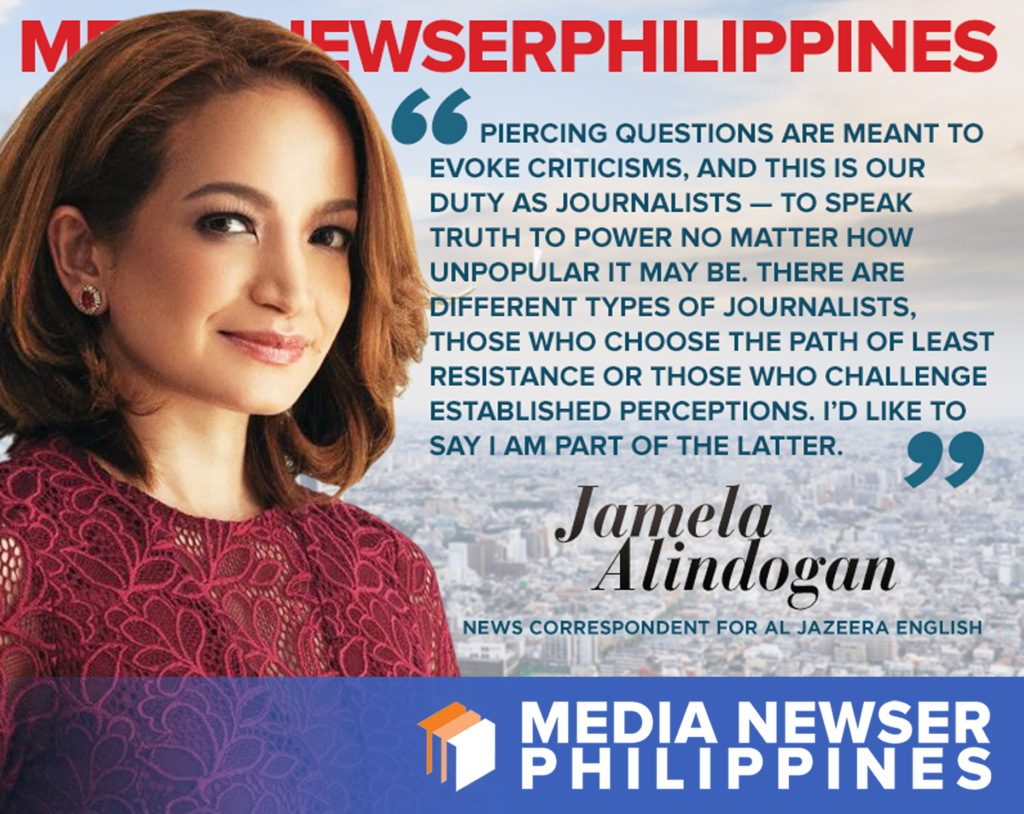
Photo: Jamela Alindogan | Artwork: Media Newser Philippines
This interview has been edited and condensed for clarity.
-

 ABS-CBN News and Current Affairs3 months ago
ABS-CBN News and Current Affairs3 months agoBato Dela Rosa loses temper on ANC, stands by drug war campaign
-

 GMA Integrated News and Public Affairs2 months ago
GMA Integrated News and Public Affairs2 months agoDear GMA-7, it’s time for a TV debate
-

 The Latest4 weeks ago
The Latest4 weeks agoTV networks gear up for the 2025 midterm elections coverage
-
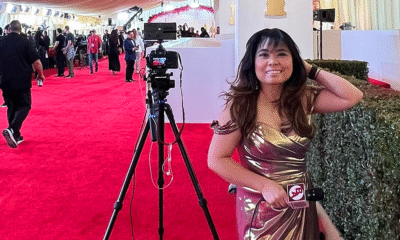
 ABS-CBN News and Current Affairs19 hours ago
ABS-CBN News and Current Affairs19 hours ago‘Here in Hollywood’: Yong Chavez launches new column for ABS-CBN
